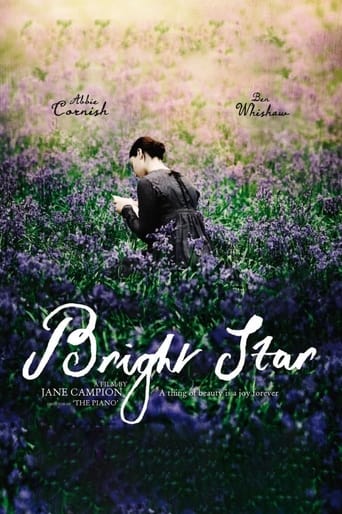SnoopyStyle
It's 1818 in Hampstead Village on outer London. Fanny Brawne (Abbie Cornish) is introduced to John Keats (Ben Whishaw). At first, he dismisses her as a fashionista. She pursues him by reading his poems. She shows compassion to his sick brother Tom who passes away. His lack of an income keeps him from truly pursuing a romance. His friend and writing mate Charles Brown (Paul Schneider) aims to show Fanny as a cruel flirt by sending her a Valentine.In the sure hands of Jane Campion, this has both a poetic and true feel of romance. She shows restraint which only heightens the passion. The Brown valentine is a shocking turn and the height of romantic drama. In particular, Abbie Cornish delivers a compelling of a relentless love from the heart and passion from the time era.
Shenoa77
It was moving. It was beautiful . Absolutely heartbreaking. Just a few words to describe this movie. Whishaw and Cornish are magnificent. Definite chemistry between the two. This movie displayed what great actors they are. I didn't want the movie to end. Immediately after watching, I researched online the characters John Keats and Fanny Brawne. Their story was one of long-suffering love. It's amazing how a director as talented as Campion can illustrate the emotion and inner-recesses of the heart. Campion did an excellent job bringing that out on the screen. Period movies and love stories should be more like this. 10 out of 10.
garrettvandrews
At its core Campion's Bright Star is an attempt to represent the essence of John Keats. Not an easy task for a director, and doubly difficult for an uninformed viewer. Keats' grave stone in Rome states: "Here lies one whose name was writ in water." Keats never lived to realize his success, he died before becoming famous. Similarly, his poems are accepted as exhibiting the recurring theme of yearning for and perhaps even glimpsing transcendence and immortality but ultimately falling back to earth. Few people are aware that the one exception to this is Keats' masterpiece of a Shakespearean sonnet, "When I Have Fears." A close reading reveals that unlike any other of Keats' works, he not only yearns for but actually reaches and achieves his goal in the heroic couplet. He transcends his mortal body and lives forever.This is why Campion selected "When I Have Fears" within her movie. This is also why, at the movie's climactic end when John Keats and Fanny Brawne must part company, there is nothing physical about that parting: no embrace or kiss, not even a look back. It is an attempt to demonstrate the immortal love Keats achieved - once -.
R Smith
I was literally stunned by this film, Campion has crafted another masterwork, and I found myself intensely relieved that I saw it in the comfort of my home rather than in a theatre. As breathtaking as I imagine it would be on the big screen I am sure I would have been removed from the theatre sobbing uncontrollably. At home I even had to pause the film several times because I just needed a break from it, yet I'd go back to it quickly, I was entirely pulled in to the story. Abbie Cornish is a revelation, I'd just seen her in Limitless, unrecognizable as the same actress. The costumes are so memorable I immediately began sketching one of her jackets to replicate (and I've never done that before from watching a period film). The art direction was haunting - like perfect still-life paintings. Fanny's little sister Toots, played by Edie Martin, delighted me every time she appeared on screen. The poetry itself, and how seriously it was taken by the characters, took me back to a seemingly simpler time and I immediately began pulling out long forgotten poetry volumes (my garden hasn't looked the same to me since seeing Bright Star).Bright Star is a must-see.




